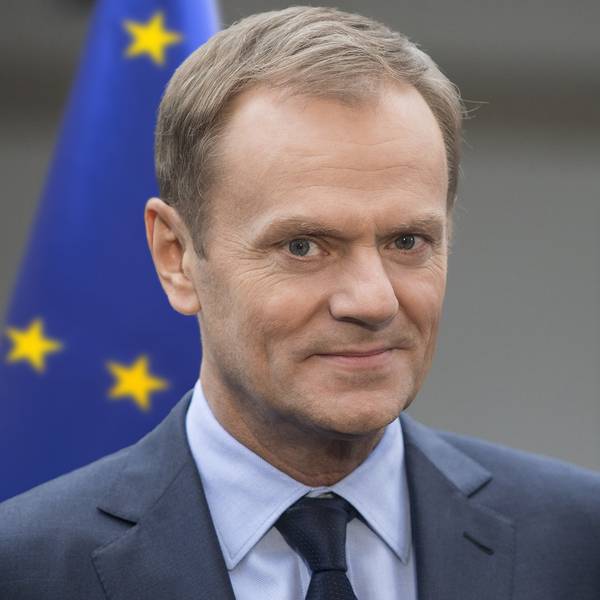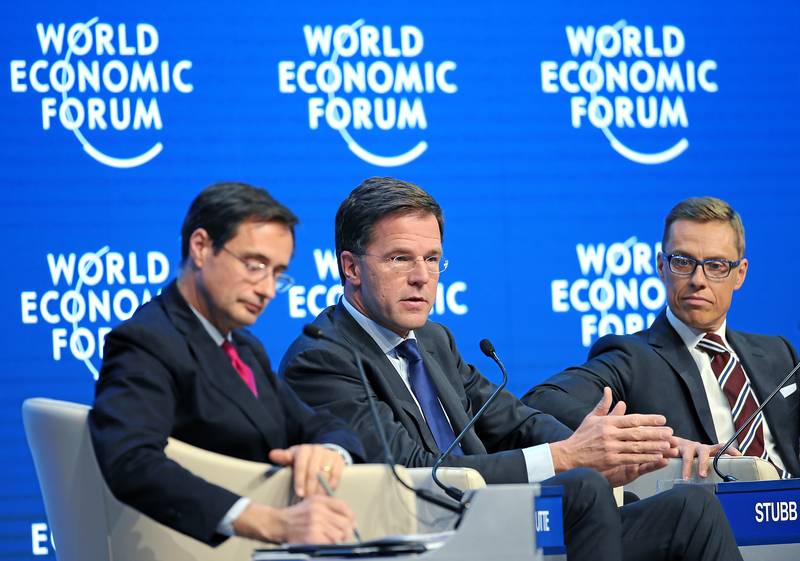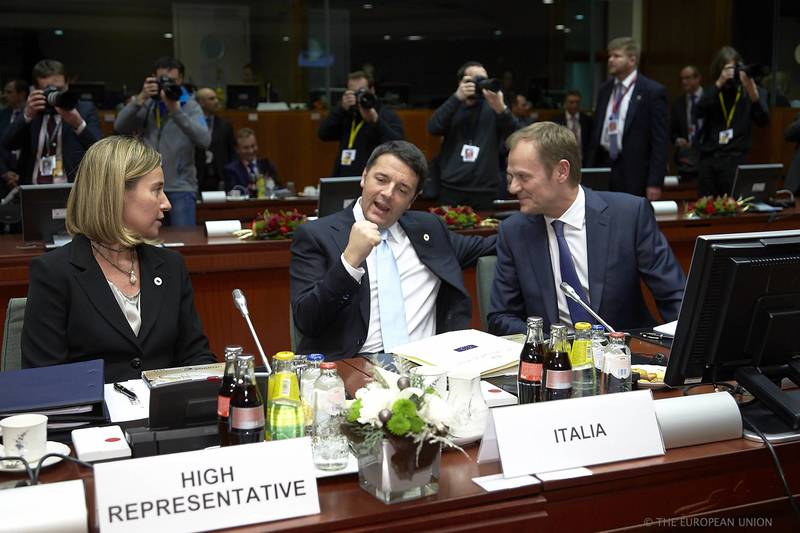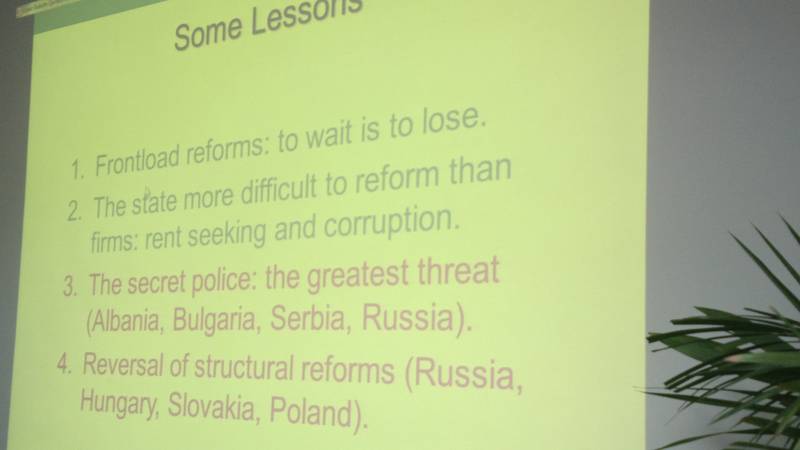Donald Tusk Offers a European Council Diet
Adelina Marini, December 18, 2014
 The first European Council of the new chief of this format, Donald Tusk, is expected to mark the beginning of a radically different practise. Instead of continuous sessions, often ending in the early hours of the next day, the former prime minister of Poland wants brief and ending before midnight first days so that everyone can go to bed in time. This, however, does not mean that the topics on the agenda of the leaders of the 28 member states will diminish. On the contrary. It means, though, that very few of them will enter the conclusions. And the topics of the December European Council will be several. The first and most important will be the economy and Jean-Claude Juncker's investment plan. The expectations are the leaders to adopt the plan in principle as well as the idea for the establishment of an investment fund the initial capital of which will be funded by the common European budget and the European Investment Bank.
The first European Council of the new chief of this format, Donald Tusk, is expected to mark the beginning of a radically different practise. Instead of continuous sessions, often ending in the early hours of the next day, the former prime minister of Poland wants brief and ending before midnight first days so that everyone can go to bed in time. This, however, does not mean that the topics on the agenda of the leaders of the 28 member states will diminish. On the contrary. It means, though, that very few of them will enter the conclusions. And the topics of the December European Council will be several. The first and most important will be the economy and Jean-Claude Juncker's investment plan. The expectations are the leaders to adopt the plan in principle as well as the idea for the establishment of an investment fund the initial capital of which will be funded by the common European budget and the European Investment Bank.
When presenting the plan in the European Parliament a month ago, Mr Juncker made a clear appeal the member states to join in with contributions. According to a high European official however, the issue of the member states' contributions will not be discussed because it is still too early. First of all the Commission should present a concrete proposal, a structure of the fund and establish it. The leaders can discuss their participation with additional money at the earliest at their spring summit in March. The leaders are not expected to discuss another very important thing - the governing structure of the future investment fund.
What to discuss then? In fact, the most difficult part - the structural reforms. Investments are not just money. Also needed is a strong commitment for structural reforms at national level and sound public finances. This is precisely the point that can kill the appetite of the leaders before their dinner, during which they will discuss a not very tasty issue - Ukraine and Russia. A group of member states insisted the summit to discuss what projects to be financed through the new plan, which does not fit into the views of the new president. For him this is not the right approach.
It is expected new sanctions against Russia to be agreed at the summit, aimed at the illegal annexation of Crimea and Sevastopol. Donald Tusk explained that actually not new sanctions are sought but the existing package to be made more efficient. It is unlikely, however, the scale that the US Congress set for President Barack Obama earlier this week to be pursued. This is precisely the issue which is expected to see the biggest change after the handover of the European Council presidency. Sources from the Council point out that Donald Tusk will not hide his views during the talks which does not mean he does not know what his role as president is. His main view in terms of the eastern crisis is that Russia is a strategic problem. The question is whether all the 28 member states share this view.
Before the summit, Mr Tusk said that in order for a durable solution to be found to the eastern problem, a new strategy has to be developed for Russia and that is going to be the central topic during the dinner of the leaders. The foundation of this strategy should be a "modern, stable, independent Ukraine", he said. This is a very serious statement which is very likely to be in conflict with his intention to finish the today's part of the summit before midnight. In front of journalists on his way in the Council building in Brussels, he hoped that he will be able to talk to them in more detail before midnight. Donald Tusk expects the leaders to send a very strong signal today.
In the draft conclusions that leaked last week in the public domain, it is pointed out that the leaders will task the Commission to present a proposal on an energy union. The source from the Council pointed out that it is not expected the leaders to set the form of the future energy union because they have already done that in the strategic guidelines from June this year. However, their vision there is quite general. They outline three priorities in it. The first is affordable energy for companies and citizens through enhancing the energy efficiency, completion of the energy market and increasing the Union's bargaining power, increasing the transparency on the gas market. The increasing of the bargaining power is probably an indicator of readiness the EU to collectively negotiate with suppliers. The second priority is energy security for all the member states which is understood as speeding up of the diversification of the energy supplies and routes, building of the necessary infrastructure, including interconnectors. The third priority is green energy.
The Commission is expected to present specific proposals for an energy union in the beginning of next year so that the leaders can discuss the details in March.
Initially, it was expected that a new or rather an updated road map for the deepening of the integration in the euro area to be discussed at this summit, but according to a high official, the details will remain for the informal European Council in February. What is possible the prime ministers and presidents to agree on today is a time-frame for the deepening of the euro area. There are expectations that during the meeting the leaders will discuss one of the hottest issues this year in EU - the flexibility of the Stability and Growth Pact. This is expected to happen in the context of the Juncker's investment plan which envisages a favourable attitude toward violations of the pact by countries that participate with contributions in the investment fund. For now, however, there are doubts that there will be any decision on the rewriting of the pact. It is very likely this issue to overtake the economic part of the summit which Tusk's team and Juncker planned to focus on the investment plan.
According to Reuters' sources, European Central Bank President Mario Draghi is expected to send a strong appeal to the leaders, especially to Prime Minister Matteo Renzi and President Francois Hollande, for structural reforms and reduction of spending. In the same time, he is expected to call on German Chancellor Angela Merkel to invest more in infrastructure.
The conclusions are expected to be significantly shorter than usual, but, as they promise from the Council, they will focus on the substance. Guy Verhofstadt, the leader of the Liberals in the European Parliament, called the plan European Council Light in association with the Coca Cola Light. The biggest surprise this year is that enlargement will not be among the issues in the conclusions. Instead, there will be a text on Lux Leaks regarding the expected Commission proposals on the transparency of tax rulings. It is curious that the slogan of Donald Tusk's first chairmanship is that he is the third most experienced person in the European Council after Angela Merkel and Jean-Claude Juncker who, in his capacity of European Commission chief, will only present his plan for stimulating investments.
 Mark Rutte, Alexander Stubb | © WEF
Mark Rutte, Alexander Stubb | © WEF Mogherini, Renzi, Tusk | © European Council
Mogherini, Renzi, Tusk | © European Council | © euinside
| © euinside